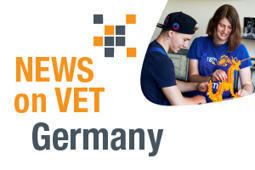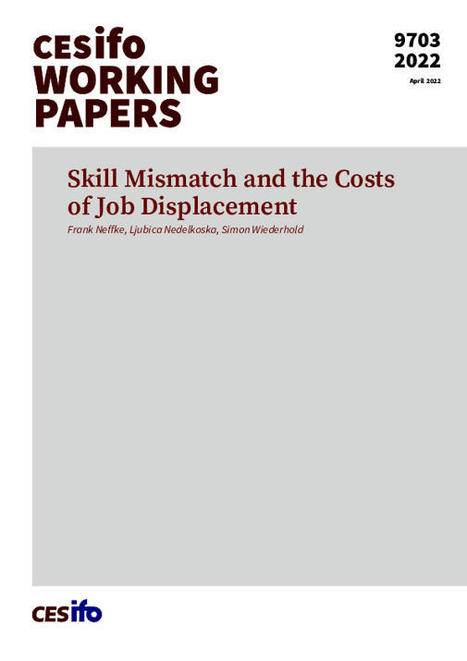 Your new post is loading...
 Your new post is loading...
In this paper, the perspective of international vocational education and training (VET) providers on the issue of transfer from Germany as a origin country to a specific target country is considered. The existing state of research on the topic of VET transfer has so far been largely located at the macro level. Still, to develop a better understanding of transfer, it is useful to include individual projects on a programme basis in the analysis as their understanding in turn shapes the entire transfer work. The study aims to identify the understanding of transfer of vocational training service providers in internationalisation projects, as well as different types of transfer. Case studies are applied that involve German VET providers, sampled from a German funding line. Based on qualitative and quantitative data, process documents and previous research, in-depth interviews with six project actors are conducted to identify the perspectives and approaches for transfer. Among other theoretical approaches, Dolowitz and Marsh's policy transfer framework and Gessler's levels of transfer form the theoretical framework of the study. In the context of the present study, different understandings of transfer can be attributed. Furthermore, using type-building content analysis, four ideal transfer types, namely imitative Re-Combination, adaptative Specialization, adaptative Re-Combination and transformative Specialization are classified. The transfer itself is determined by the project activity rather than by a pre-determined understanding of transfer on the part of the internationally active VET provider. In turn, the project activity shapes the type of transfer in combination with the project partners in the target country context. The project actors focus on structures and content; the transfer of practices and processes is largely understood implicitly and thus less directly forced.
Against the backdrop of a worsening shortage of skilled workers, it is becoming increasingly important to be able to offer young people attractive and up-to-date vocational training. In many training occupations, knowledge can often only be acquired through haptic learning moments, which involves certain risks and a large consumption of materials and other resources. This is where projects come in, which can simulate training practice in a resource-saving way with the help of digital technologies, such as data glasses (augmented reality glasses, AR glasses), virtual reality and artificial intelligence (AI).
To access and complete VET, refugees depend on supporting measures to overcome a variety of barriers, e.g. regarding language training and access to apprenticeships. Overall, reforms in Germany demonstrate promising initiatives to overcome the barriers to the integration of refugees in VET, while reforms in Austria and Denmark have limited refugees’ opportunities to access and complete VET.
For adolescents, preventing a premature training termination (PTT) and withdrawal from education and training after a PTT is an important societal task. While studies reveal that early-risk factors such as a low educational background or selected personality constructs are relevant for predicting PTT, less is known about subsequent trajectories after a PTT and the factors that determine them.
This study explores school-to-work transitions in Germany, aiming to achieve a richer understanding of the complexity of labour market entry trajectories while focusing on transition measures. The term transition measures refers to additional training courses that complement the regular vocational education and training system of firm-based or school-based qualification routes. The contribution of supplementary training measures to the school-to-work transitions of young adults is a controversial issue. While programmes aim to ease the transitions of low-skilled youth in the training and labour market, critics point to the risks of long-term subsidised careers or fragmented employment trajectories in subsequent years.
Higher education institutions are striving to lower student dropout rates to increase the number of academically qualified persons in the labour market and decrease misguided investment. Researchers generally acknowledge that students who are firmly decided on their studies tend to drop out of their studies less frequently. Building on the extended expectancy-value model via the cost component, this longitudinal study investigates changes in and the impact of students’ motivation on career decidedness and intention to drop out. We analysed data from 351 first-year university students aiming to become teachers across three measurement points, finding that the task effort of students and, to a lesser degree, their interest value was related to career decidedness and, indirectly, to the intention to drop out after the first year in higher education. Moreover, the results revealed that these students’ ability beliefs increased and interest value decreased from the beginning to the end of the first year at higher education. Accordingly, we discuss the theoretical and practical implications taken from these findings.
Despite high drop-out rates from vocational education and training (VET) throughout most countries and a long research tradition on potential drop-out reasons, little is known about the effects exerted on drop-out intentions by the quality of training. Furthermore, only rarely do scholars distinguish between different drop-out directions, and systematic insights on possibly differing causes are scarce.
VET (vocational education and training) is a highly complex, multidimensional worldwide phenomenon with diverse structures. Additionally, very different actors define the functions of a national (or even a regional) VET system. The paper contributes to a better understanding of the policy frameworks and current states of such systems. Therefore, we focus on selected VET systems in order to understand their specifics and thus, their market conditions. A qualitative approach is used to answer the research question regarding which conditions create or support market-based opportunities for the provision of commercial vocational training services. We find that the liberalism and deregulation of the VET sectors, as well as the marketisation of VET practices, lead to incentives to internationalise VET offers. Thinking in terms of skills, the kind of education system does not play a role. This is the case in liberal market-driven VET approaches (here, the UK, the USA and Australia) and is mirrored in the micro-analysis categories of curricula, learning location, content, and learning process.
A firm’s expectation about the future business cycle is an important determinant of the decision to train apprentices, especially as German firms typically offer apprenticeships to either fill future skilled worker positions, or as a substitute for other types of labor. The current coronavirus crisis will have a strong and negative impact on the German economy, according to the current business cycle expectations of German firms. To the extent that the training decisions of firms depend on these perceptions, we expect a downward shift in firm demand for apprentices and consequently also a decrease in the equilibrium number of apprenticeship contracts.
This short description contributes to better understanding of vocational education and training (VET) in Germany by providing insight into its main features and highlighting system developments and current challenges.
It is essential that skills-based training should be given a higher funding priority.
Digital skills are thought to be a key competence of the twenty-first century. With the rapid growth of internet and communication tool (ICT) usage among both students and teachers, cooperative (co-op) education programmes, like other educational institutions, face the challenge of integrating and supporting digital skill development. However, little is known about how these skills are developed prior to entering cooperative education programmes. Against this background, a sample of 893 freshers, ranging from vocational students to co-op students, were tested according to their digital skills. The analysis shows that co-op students have a higher level of competence than vocational students. In addition, we found that in our sample social background has no impact on digital competences. The results are discussed and classified in the context of the current state of research.
Employees with vocational qualifications are contributing significantly to maintaining the German economy and to ensuring that fundamental basic needs are met.
|
Vocational education and training (VET) is an important part of education systems around the world. VET systems differ widely between countries in how programmes are designed and delivered. Moreover, countries differ in terms of the types of providers that deliver VET. This report looks at the VET provider landscape in Australia, Denmark, Germany, the Netherlands and Sweden. It provides insights into the number of different providers by country, their focus areas and target populations. It describes how providers are different and how they overlap, as well as structures and initiatives to foster co-ordination between them.
Motivated by discussions of skill mismatches on local German vocational educational and training (VET) markets, this paper analyses how occupational segments of VET entry of individuals with lower and intermediate secondary school degree relate to local labor market characteristics.
Teachers and in-company trainers are central to vocational education and training (VET), as they support the school-to-work transitions of learners from diverse backgrounds. VET teachers develop learners’ skills in school-based settings, while in-company trainers support learners during their time in work-based learning. Countries use different strategies to ensure an adequate supply of well-prepared VET teachers and trainers. This report focuses on two aspects: entry requirements for the VET teaching and training profession to ensure quality and consistency; and initial education and training for VET teachers and trainers to ensure that they are well-prepared when taking up their role. It draws lessons from policies and practices in Canada, Denmark, Germany, the Netherlands and Norway for developing a skilled teaching and training workforce through entry requirements and training, while maintaining sufficient flexibility.
This article briefly presents the legal position for inclusion in VET both from the international perspective and from the German educational policy perspective. It considers a broad definition of inclusion which regards not only persons with disability but all individual characteristics and abilities, followed by specific information on the German VET system and its heterogeneity. A particular focus is drawn on recent measures for the inclusion of refugees and persons with disability. These changes present challenges for VET teachers. This article discusses recent research projects analysing the attitudes and thoughts towards inclusion of VET teachers and the skills required for VET teachers in inclusive work at vocational schools. To end, initiatives of German universities which aim for better preparation of future VET teachers in inclusive education will briefly be presented along with perspectives for future research.
When workers are displaced from their jobs in mass layoffs or firm closures, they experience lasting adverse labor market consequences. We study how these consequences vary with the amount of skill mismatch that workers experience when returning to the labor market. We find that displacements increase the probability of occupational change eleven fold, and that the type of skill mismatch after displacement is strongly associated with the magnitude of post-displacement earnings losses. Whereas skill shortages are associated with relatively quick returns to the counterfactual earnings trajectories that displaced workers would have experienced absent displacement, skill redundancy sets displaced workers on paths with permanently lower earnings.
In a series of virtual bilateral workshops held from February to April 2021, the German Federal Ministry of Education and Research (BMBF) and their partner ministries in seven countries – Costa Rica, Ghana, Israel, Italy, Russia, South Africa, and USA – discussed the effects of the COVID-19 pandemic on Vocational Education and Training (VET), employment, and youth. GOVET (German Office for International Cooperation in VET) asked policy makers, researchers, and practitioners to share their experiences, fi rst lessons learned, best practices, and response strategies. This publication documents the outcomes. The contributions range from hands-on practical reports to in-depth VET research findings, from rather analytical perspectives to policy consultancy and strategic ideas.
Against the background of digital transformation processes that are currently changing the world of work, this paper examines general digital competences of beginning trainees in commercial vocational education and training (VET) programs.
Digitalization is changing our everyday work lives and occupations. It has introduced new processes and shifting requirements to the world of work such as Big Data, Internet of Things, Artificial Intelligence, Robotics, drones and computer-aided tools.
Adolescents from ethnic minorities face more difficulties in accessing vocational training in Germany than peers of native parentage. Recruiting practices of companies who employ apprentices are crucial in this. Surprisingly, a new study finds that employers consider linguistic articulateness very important.
The research presented here aims to assemble and organize all existing survey instruments in the VET context and to develop a comprehensive and validated questionnaire for dual VET that measures workplace characteristics (VET-LQI). For this purpose, 43 test instruments were identified and categorized using a qualitative meta-synthesis, and integrated into a general theoretical framework (Tynjälä 2013). The results of the meta-synthesis reveal diverse content areas as the current foci of VET quality research. The applicability of any existing survey is limited, as the majority of studies either focus on a small range of selected categories and/or do not report the validation results of their scales. Hence, a synthesized item pool was used. Short scales were extracted and tested in seven commercial training occupations in Germany, which covered all identified content areas of VET quality research.
Vocational education and training (VET) in Germany is based on close cooperation between the State, companies and social partners. Germany’s VET is a successful model, largely based on the dual system (apprenticeship) leading to high-quality vocational qualifications, valued on the labour market. Apprenticeship enables smooth education-to-work transitions, resulting in low youth unemployment: in 2019, 5.8% of those aged 15 to 24 versus 15.1% in the EU-27.
Various actions have been launched in Germany to keep the vocational education and training system stable. Securing the remuneration of apprentices, organising learning and examinations according to safety regulations, and supporting companies that offer apprenticeship places are at the core of the activities.
|



 Your new post is loading...
Your new post is loading...



















